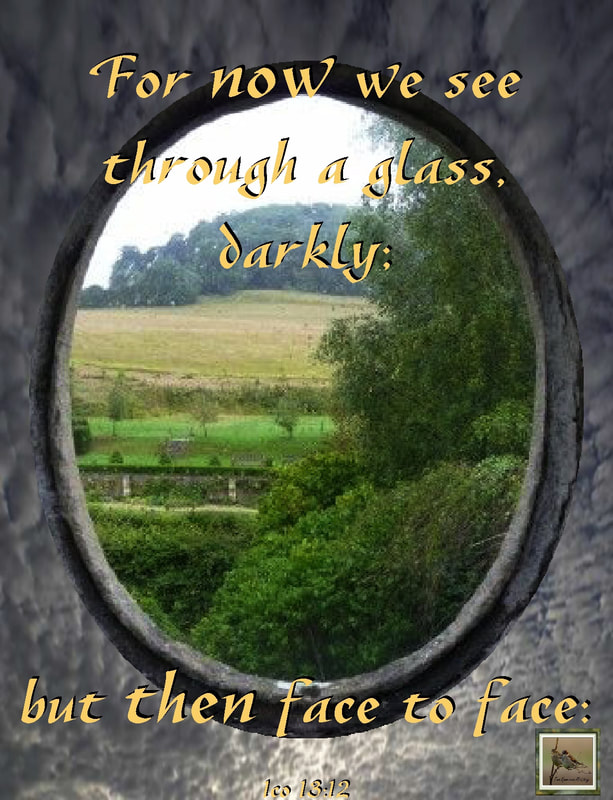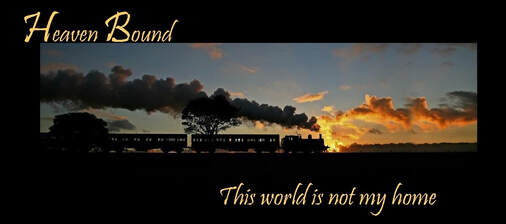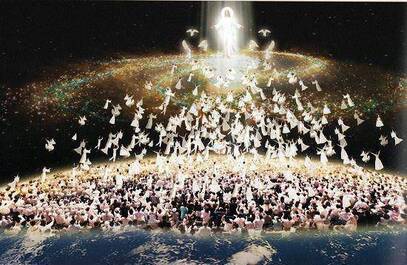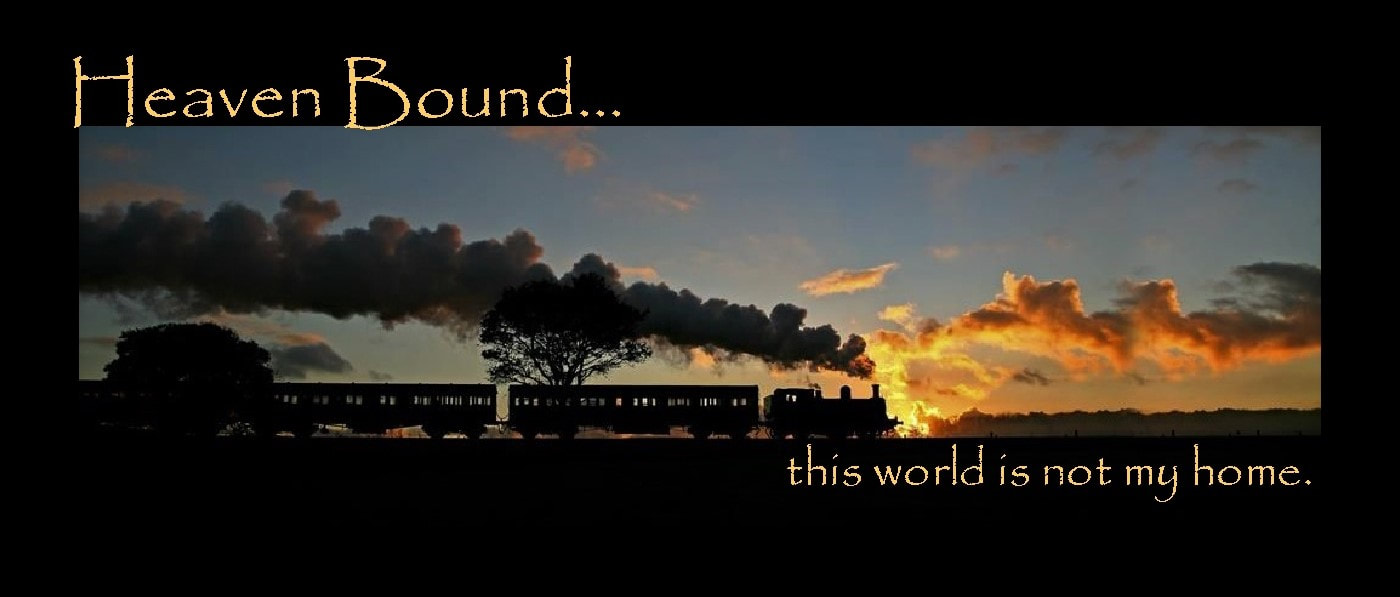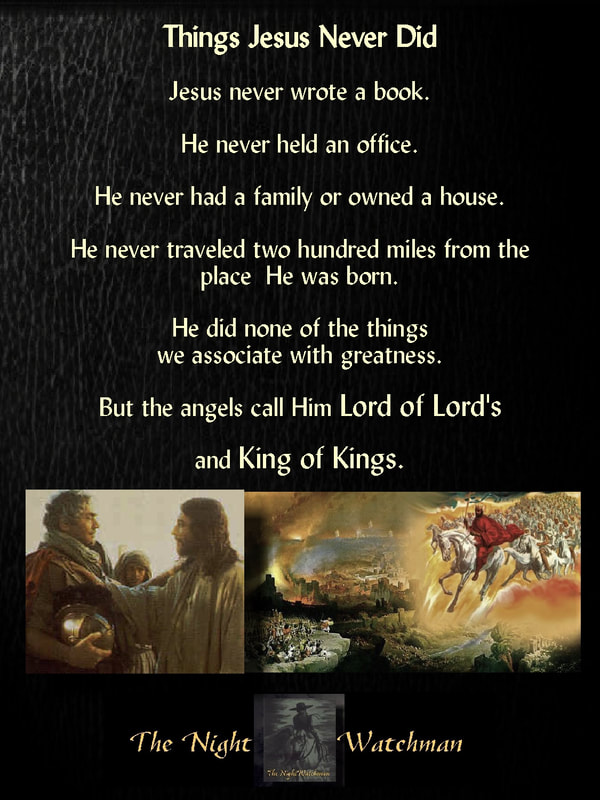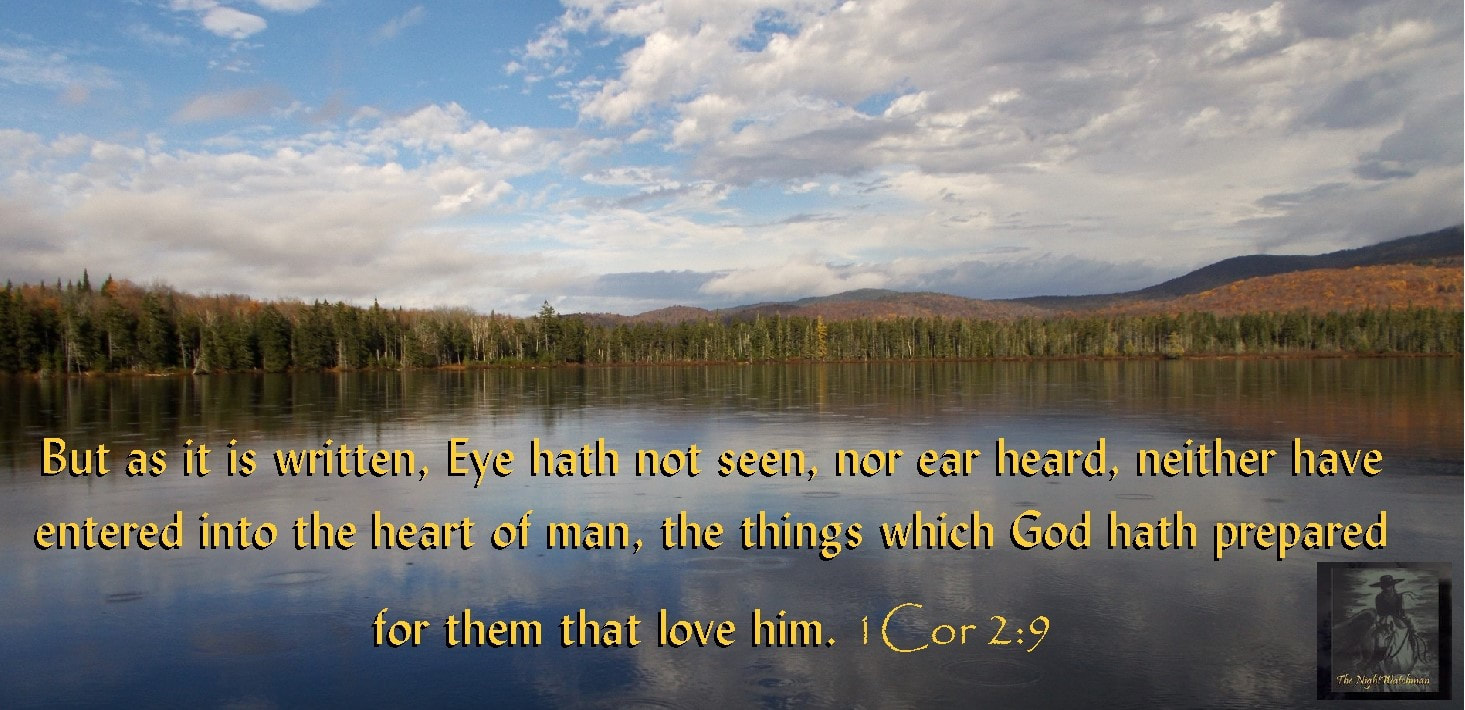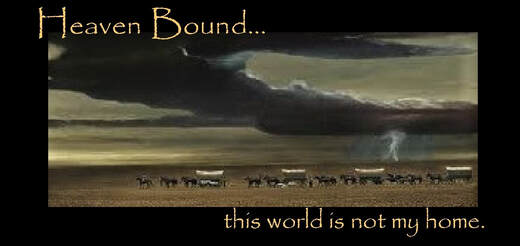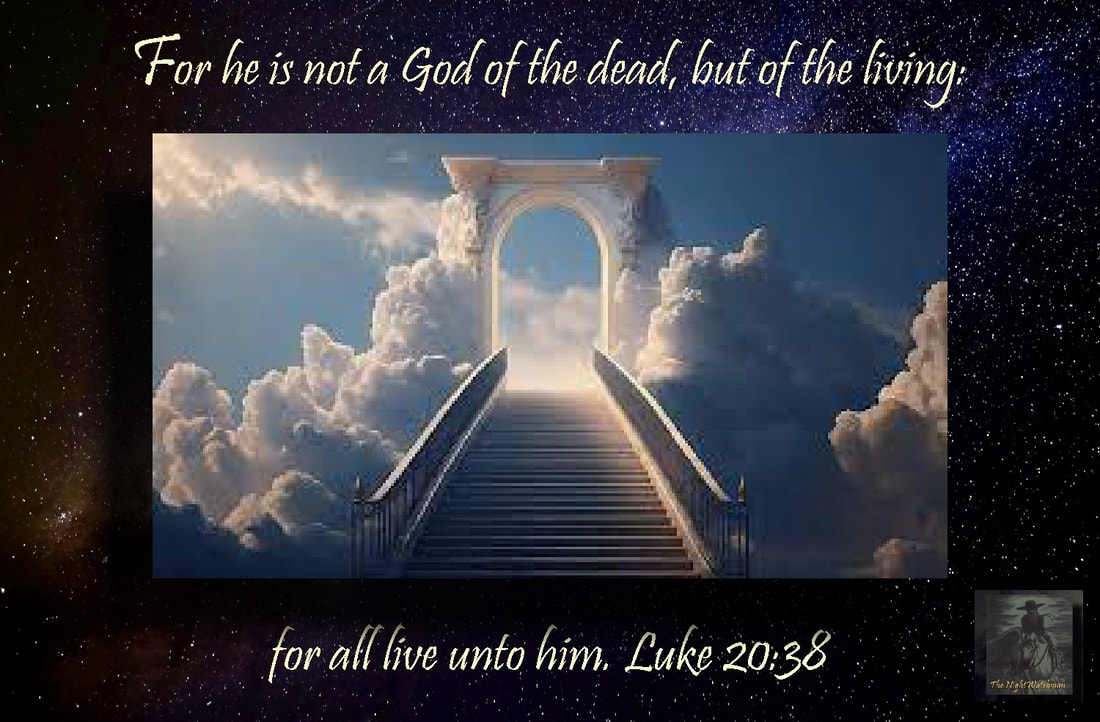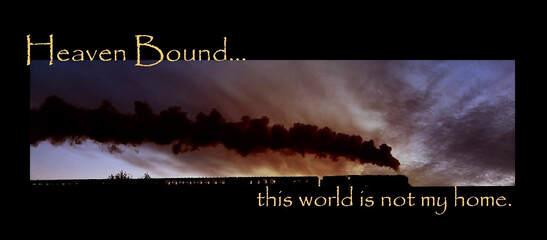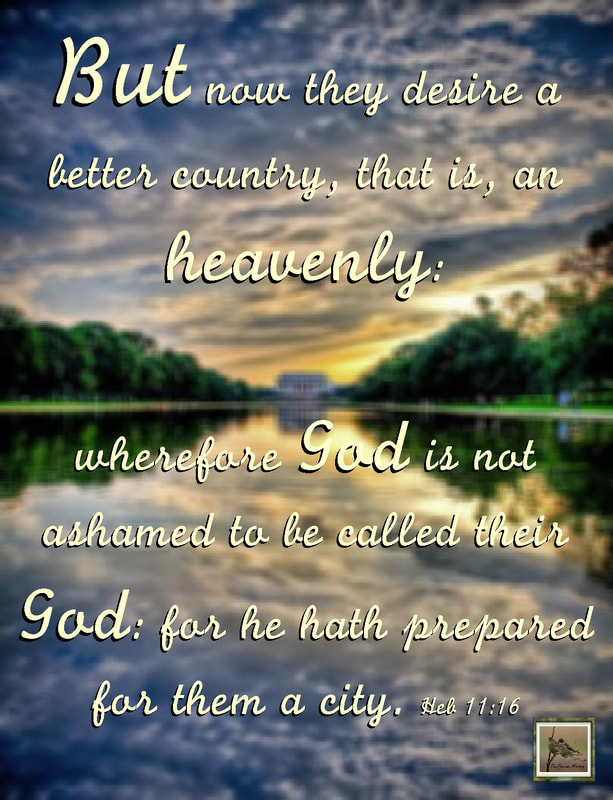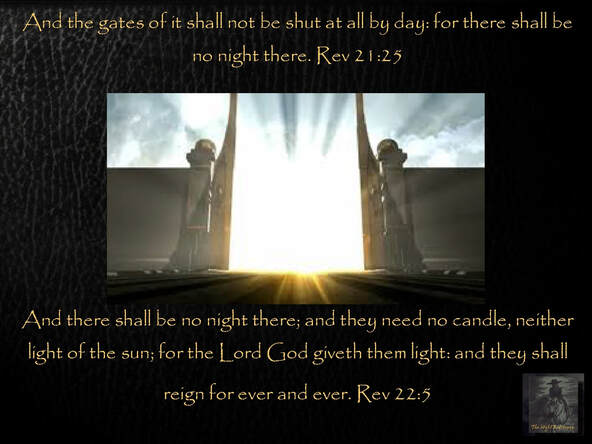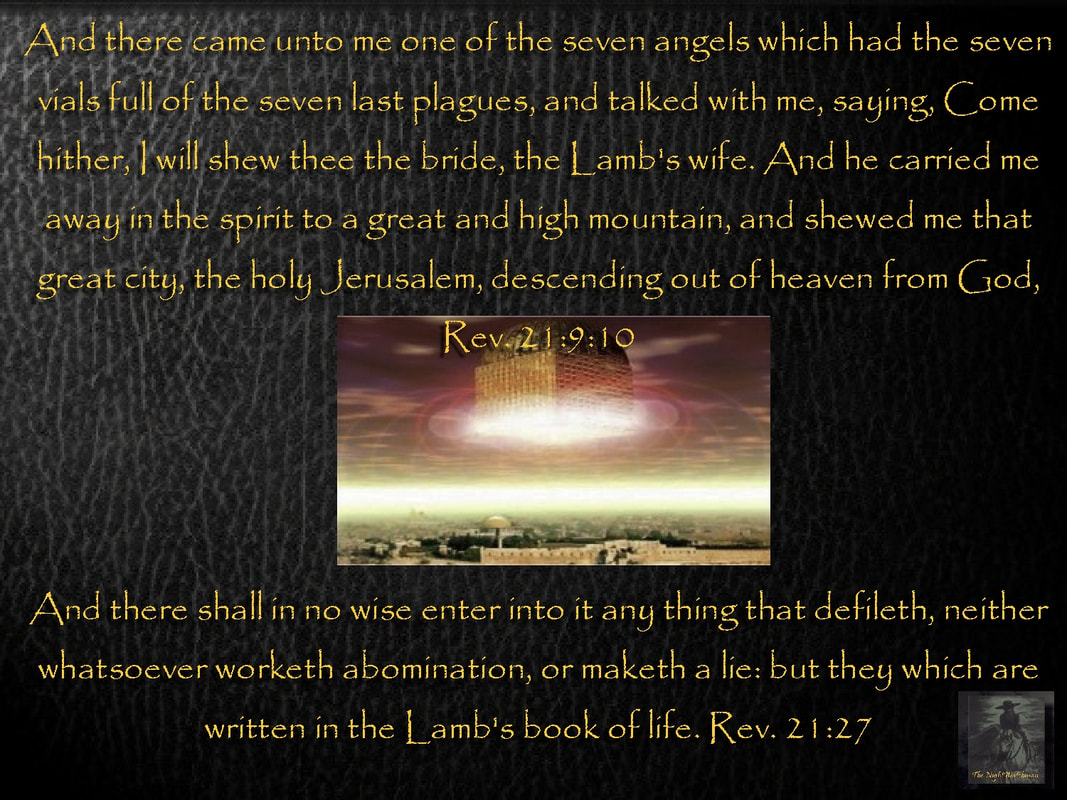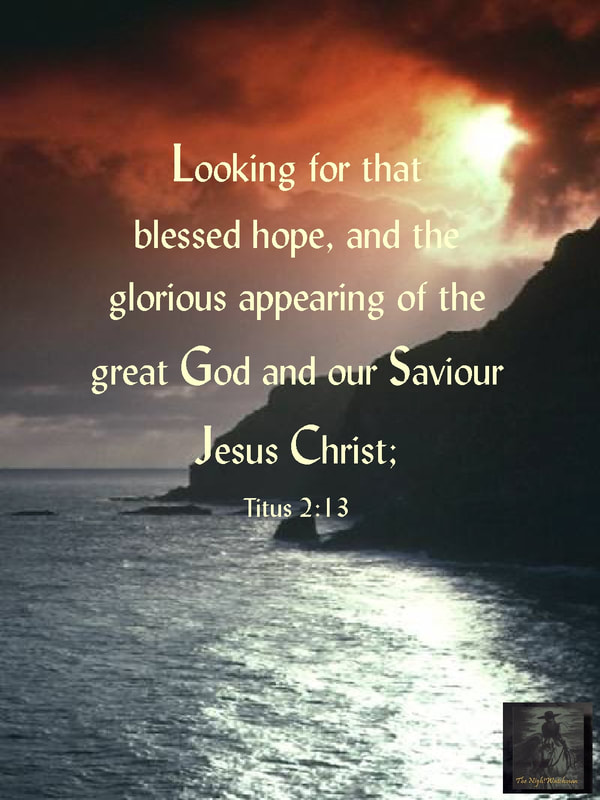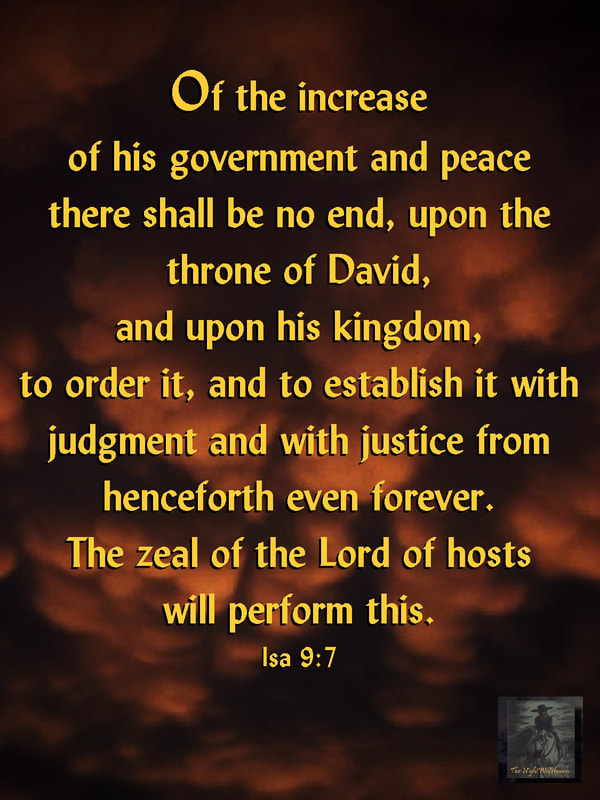|
Now there were with us seven brethren: and the first, when he had married a wife, deceased, and, having no issue, left his wife unto his brother: Likewise the second also, and the third, unto the seventh. And last of all the woman died also. Therefore in the resurrection whose wife shall she be of the seven? for they all had her. Jesus answered and said unto them, Ye do err, not knowing the scriptures, nor the power of God. For in the resurrection they neither marry, nor are given in marriage, but are as the angels of God in heaven. But as touching the resurrection of the dead, have ye not read that which was spoken unto you by God, saying, I am the God of Abraham, and the God of Isaac, and the God of Jacob? God is not the God of the dead, but of the living. Mat 22;25-32 The Joys of Heaven The Gauls, an ancient people of France, after they had once tasted of the sweet wine of the grapes that grew in Italy, inquired after that country where such pleasant liquor was, and understanding of it, they made towards that place, and never rested till they came thither where such pleasant things grew. Could we only realize something of the joys of heaven, should we not more earnestly set ourselves to find the way? This thought often sustained Christian martyrs in their sufferings. The angelic life: We must all of us develop one way or the other; manhood here is but the corn in the ear. I. In what respects are these saints who have passed the stream of death like unto the angels. 1. The saints of God are like unto the angels as to the qualities of their persons. Sex is obliterated not in mental characteristics, but in bodily frame. Alike in their immortality they cannot die. Like the angels in the maturity of their being, the body is raised in glory. Resemble the angels in beauty, and equal them in strength. What a blessed personality will be yours when the present age is past. 2. There will be likeness between the angels and glorified saints in the matter of character. No inbred sin. Purity and perfection. 3. The souls of the blessed are like to angels as to their occupation. Adoration; wondering study; gazing upon God; untiring service-these their occupations. 4. We shall be like the angels in heavenliness. Here we want externals; eat and drink: there no desires of an earthly kind. 5. Like the angels as to our happiness. II. The angelic life on earth. We may be like angels here below. 1. Be it ours, as it was theirs, to declare the word of God. 2. For fighting a good fight. Michael and his angels fought against the dragon. 3. In setting free those who are the prisoners of hope. The angel came to Peter in prison. 4. In ministering comfort to those who are saved. An angel said to Paul, “Fear not.” 5. In watching our souls. (C. H. Spurgeon.) The Sadducees Silenced I. GIVE SOME ACCOUNT OF THE SADDUCEES:—A small number of men of rank and affluence, who had shaken off such opinions and practices as they deemed a restraint upon their pleasures. They acknowledged the truth of the Pentateuch, but rejected the tradition of the elders. They also denied a future state, and believed that the soul dies with the body. II. CONSIDER THE ARGUMENT OF THE SADDUCEES. III. CONSIDER HOW JESUS CHRIST ACTED ON THIS OCCASION. 1. He removed the difficulty which had puzzled the Sadducees. They had not studied the Scriptures with sufficient attention, and a sincere desire of understanding their meaning. If they had done so, they could not have doubted of a future state. If, again, they had reflected on the power of God, they would have concluded that what might appear difficult or impossible to man, is possible and of easy accomplishment with God. He then explained the difficulty. It is to be observed, however, that He speaks only of the righteous. On this subject our Savior reveals two important truths,—First, that the righteous never die; and, secondly, that they become like the angels. 2. Our Savior, then, having removed the difficulty which had embarrassed the Sadducees, and having at the same time communicated new and important information concerning the world of spirits, next proceeded to prove from Scripture the certainty of a future state. He argued from a passage in the Book of Exodus, where God is represented as speaking from the burning bush to Moses, and saying, “ I am the God of Abraham, of Isaac, and of Jacob” (Exo_3:6). It is here particularly to be observed, that the force of our Savior’s argument rests upon the words, I am the God. Had the words been I was the God, the argument would be destroyed. IV. ATTEND TO THE INFERENCES WHICH WE MAY JUSTLY DRAW FROM THIS SUBJECT. 1. A difficulty arising from our ignorance is not sufficient to disprove or weaken direct or positive evidence. 2. Although a future state is not clearly revealed in the Books of Moses, yet it is presupposed, for the passage here selected can be explained only on the assurance that there is such a state. 3. From our Savior’s declaration here, we also obtain the important information, that the righteous, after their removal from this world by death, do not sink into a state of sleep or insensibility; for the passage which He quotes implies that Abraham, Isaac, and Jacob, after death, remained alive, and still continued to acknowledge and serve God; for all these things are included in what our Savior says. Now, the inference we draw is, that what is true respecting the patriarchs we may safely extend to all good men, that they are all in a similar situation. 4. While informed by our Savior, in the parable of the rich man and Lazarus, that immediately after death angels are employed to conduct the spirits of the righteous to paradise, we are also assured here by the same authority, that they shall be made like to the angels. When to these we add the passage quoted above, from the Epistle to the Hebrews, respecting the office of angels, it appears necessarily to follow that the righteous shall be elevated in rank and situation; for they shall associate with celestial beings, and consequently will receive all the benefits which can arise from society so pure and exalted. Nor can we help believing that while thus mingled with angels they will be engaged in similar duties and employments. (J. Thompson, D. D.) The world to Come I. THAT THERE IS ANOTHER STATE OF BEING BESIDE AND BEYOND THE PRESENT STATE. None can deny the importance of the question, “If a man die, shall he live again?” 1. The traditions of universal belief. It is said that there is not, perhaps, a people on the face of the earth which does not hold the opinion, in some form or other, that there is a country beyond the grave, where the weary are at rest. Yet this universality of belief is no proof; it is but a mere presumption at best. 2. Certain transformations which take place in nature around us. Such as that of the butterfly from the grave of the chrysalis, and spring from the grave of winter. Such analogies, however, although appropriate as illustrations, are radically defective as proofs. The chrysalis only seemed dead; the plants and trees only seemed to have lost their vitality. 3. There is, again, the dignity of man. But while much may be said on one side of this question, not a little can be said on the other. “Talk as you will,” it has been said, “of the grandeur of man—why should it not be honor enough for him to have his seventy years’ life-rent of God’s universe? 4. It is by the gospel alone that life and immortality have been brought to light. II. THAT THE FUTURE STATE IN MANY IMPORTANT PARTICULARS IS WIDELY DIFFERENT FROM THE PRESENT STATE. They differ-- 1. In their constitution. “The children of this world marry, and are given in marriage;” but there will be nothing of this kind in heaven. The institution of marriage is intended to accomplish two great objects. (1) the propagation of mankind. But in that world the number of the redeemed family will be complete, and hence marrying and giving in marriage will be done away. (2) Mutual help and sympathy. 2. In the blessedness enjoyed. (1) Negative. “Neither can they die any more.” (2) Positive. “They shall be equal unto the angels—in nature, immortality, purity, knowledge, happiness.” It is further added, that they will be “the children of God, being children of the resurrection.” To the blessing of adoption several gradations appertain. What is spoken of here is the highest. The apostle refers to it in those striking words, “Because the creature itself shall be delivered,” etc. (Rom_8:21-23). III. THAT BEFORE THIS GLORIOUS STATE CAN BE ENTERED UPON, CERTAIN PRE-REQUISITES ARE INDISPENSABLY REQUIRED. None can attain the world but those which shall be accounted worthy. Two things may be here noticed. 1. Our guilty persons must be accepted. That can only be done through the Lord Jesus—winning Christ, and being found in Him, not having on our own righteousness. 2. Our sinful nature must be renewed. Worthiness and meetness are often used as synonymous terms. Thus we read in one place, “Bring forth fruits worthy of repentance”; in another, “Bring forth fruits meet for repentance.” So with the worthiness in the passage before us; it is to be understood as indicating meekness for the heavenly inheritance. Now, nothing that defileth can enter there. Holiness of heart and life is an essential qualification. The pure alone shall see God. (Expository Outlines.) The Mortal and the Immortal Ours is a dying world; and immortality has no place upon this earth. That which is deathless is beyond these hills. "Neither can they die any more" is the prediction of something future, not the announcement of anything either present or past. We are still under the reign of death, and this is the hour and power of darkness. The day of the destruction of death and the unlocking of sepulchers is not yet. It will come in due time. Meanwhile, we have to look on death; for our dwelling is in a world of death—a land of graves. If then we would get beyond death’s circle and shadow we must look above. Death is here, but life is yonder. The fading is here, the blooming is yonder. Death, which is now a law, an inevitable necessity, shall then be an impossibility. They who are partakers of the first resurrection and of the world to come are made for ever immortal. This is the triumph of life. It is more than resurrection: for it is resurrection with the security that death can never again approach them throughout eternity. [H. Bonar, Short Sermons] THE GOD OF THE LIVING Here our Lord answers the materialism of His time. He speaks with the note of absolute certainty concerning the unseen, Heb_11:27.
Heb 11:27 By faith he forsook Egypt, not fearing the wrath of the king: for he endured, as seeing him who is invisible. Its inhabitants do not die or marry, nor are they subject to the conditions of our earthly life. These are the children of the resurrection. What an inspiring title! May it be applied to us as in Col_3:1-4? Col 3:1 If ye then be risen with Christ, seek those things which are above, where Christ sitteth on the right hand of God. Col 3:2 Set your affection on things above, not on things on the earth. Col 3:3 For ye are dead, and your life is hid with Christ in God. Col 3:4 When Christ, who is our life, shall appear, then shall ye also appear with him in glory. Too many are “the sons of this age,” Luk_20:34 Luk 20:34 And Jesus answering said unto them, The children of this world marry, and are given in marriage: They adopt this transient earth as their foster parent! We cannot belong to both, though some, like Bunyan’s waterman, row in one direction, while they look in another. How wonderful to find a proof of immortality in that passage about the bush. Exo_3:6 Exo 3:6 Moreover he said, I am the God of thy father, the God of Abraham, the God of Isaac, and the God of Jacob. And Moses hid his face; for he was afraid to look upon God. The fact that Jehovah said, “I am the God of Abraham,” proved that the patriarch was in existence somewhere at that moment. Those whom we describe as dead are living people who have died. Death is but a passage, a step. There is no break in the chain of existence. Yonder and here all live unto God. Rom 14:8 For whether we live, we live unto the Lord; and whether we die, we die unto the Lord: whether we live therefore, or die, we are the Lord's. [F.B. Meyer] Beloved, now are we the sons of God, and it doth not yet appear what we shall be: but we know that, when he shall appear, we shall be like him; for we shall see him as he is. 1Jn 3:2 This we know—we shall be like Him "Jesus Christ was transfigured before His disciples. Mat 17:1 And after six days Jesus taketh Peter, James, and John his brother, and bringeth them up into an high mountain apart, Mat 17:2 And was transfigured before them: and his face did shine as the sun, and his raiment was white as the light. That was a glorious manifestation, and when the three privileged disciples who beheld His glory on the Mount were permitted to do so, when the period of enjoined silence had passed, they testified to that glory in glowing words. And here we are told by one of their number that Jesus Christ’s disciples are to be transfigured, not now and here, but in the future life, at the termination of the present dispensation, at His appearing or coming. We are told that in that day they shall be like Him, like Him whose face when He was transfigured was like the sun, and whose raiment was white and glistering, and who will come forth in His second appearing in His own glory and in the glory of His Father and of the holy angels. In that day His disciples shall be glorified together with Him. Not all men, but His disciples, they who have received Him, who believe on His Name, and to whom He gives power to become the sons of God." [Great Texts] In the description given of Jesus transfigured before Peter James and John, we get a glimpse of the Lord as He will appear in heaven. This event also opens up the truths of Jesus' preeminence, and that it reveals Jesus as the "I Am" who spoke with Moses on Mt. Sanai. Going further, it opens up to us these facets of how His majestic transfiguration, gives us a picture of our future when we join Him in glory. This excerpt below helps break this down for us: Now are we the sons of God - He speaks of those who are begotten of God, and who work righteousness. See the preceding chapter. And it doth not yet appear what we shall be - It is not yet manifest; though we know that we are the children of God, we do not know that state of glorious excellence to which, as such, we shall be raised. When he shall appear - When he shall be manifested; i.e., when he comes the second time, and shall be manifested in his glorified human nature to judge the world. We shall be like him - For our vile bodies shall be made like unto his glorious body; we shall see him as he is, in all the glory and majesty both of the Divine and human nature. See Php_3:21; and Joh_17:24 Joh 17:24 Father, I will that they also, whom thou hast given me, be with me where I am; that they may behold my glory, which thou hast given me: for thou lovedst me before the foundation of the world. Php 3:21 Who shall change our vile body, that it may be fashioned like unto his glorious body, according to the working whereby he is able even to subdue all things unto himself. Father, I will that they also whom thou hast given me be with me where I am, that they may behold my glory. John had seen his glory on the mount when he was transfigured; and this we find was ineffably grand; but even this must have been partially obscured, in order to enable the disciples to bear the sight, for they were not then like him. But when they shall be like him, they shall see him as he is - in all the splendor of his infinite majesty." [Adam Clarke] By and by Charles H. Spurgeon “It doth not yet appear what we shall be.” At present we are veiled, and travel through the world incognito. 1. Our Master was not made manifest here below. (1) His glory was veiled in flesh. (2) His Deity was concealed in infirmity. (3) His power was hidden under sorrow and weakness. (4) His riches were buried under poverty and shame. 2. We are not fit to appear in full figure as yet. (1) The son is treated as a servant while under age. (2) The heir is kept a pensioner till his majority. (3) The prince serves as a soldier before he reaches the throne. 3. This is not the world to appear in. (1) There are more to appreciate us, and it would be as though kings showed their royalty at a wake, or wise men discoursed philosophy before fools. (2) A warring and waiting condition like the present would not be a fit opportunity for unveiling. (a) The winter prepares flowers, but does not call them forth. (b) The ebb tide reveals the secrets of the sea, but many of our rivers no gallant ship can then sail. (c) To everything there is a season, and this not the time of glory. “But we know that when he shall appear.” 1. We shall speak of our Lord’s manifestation without doubt. “We know.” 2. Our faith is so assured that it becomes knowledge. (1) He will be manifest upon this earth in person. (2) He will be manifest in perfect happiness. (3) He will be manifest in highest glory. (4) He will appear surely, and so we speak of it as a date for our own manifesting—“when He shall appear.” “We shall be like him.” We shall then be as manifested and as clearly seen as He will be. The time of our open presentation at court will have come. 1. Having a body like His body: sinless, incorruptible, painless, spiritual, clothed with beauty and power, and yet most real and true. 2. Having a soul like His soul: perfect, holy, instructed, developed, strengthened, active, delivered from temptation, conflict, and suffering. 3. Having such dignities and glories as He wears: kings, priests, conquerors, judges, sons of God. IV. “We shall see him as he is.” 1. This glorious sight will perfect our likeness. 2. This will be the result of our being like Him. 3. This will be evidence of our being like Him, since none but the pure in heart can see God.
When the Veil is Lifted John's Vision of the Son of Man Rev 1:9 I John, who also am your brother, and companion in tribulation, and in the kingdom and patience of Jesus Christ, was in the isle that is called Patmos, for the word of God, and for the testimony of Jesus Christ.
Rev 1:10 I was in the Spirit on the Lord's day, and heard behind me a great voice, as of a trumpet, Rev 1:11 Saying, I am Alpha and Omega, the first and the last: and, What thou seest, write in a book, and send it unto the seven churches which are in Asia; unto Ephesus, and unto Smyrna, and unto Pergamos, and unto Thyatira, and unto Sardis, and unto Philadelphia, and unto Laodicea. Rev 1:12 And I turned to see the voice that spake with me. And being turned, I saw seven golden candlesticks; Rev 1:13 And in the midst of the seven candlesticks one like unto the Son of man, clothed with a garment down to the foot, and girt about the paps with a golden girdle. Rev 1:14 His head and his hairs were white like wool, as white as snow; and his eyes were as a flame of fire; Rev 1:15 And his feet like unto fine brass, as if they burned in a furnace; and his voice as the sound of many waters. Rev 1:16 And he had in his right hand seven stars: and out of his mouth went a sharp twoedged sword: and his countenance was as the sun shineth in his strength. Rev 1:17 And when I saw him, I fell at his feet as dead. And he laid his right hand upon me, saying unto me, Fear not; I am the first and the last: Rev 1:18 I am he that liveth, and was dead; and, behold, I am alive for evermore, Amen; and have the keys of hell and of death. "I am he that liveth, and was dead - I was indeed once dead, but now I live, and shall continue to live forever. This would at once identify him who thus appeared as the Lord Jesus Christ, for to no one else could this apply. He had been put to death; but he had risen from the grave. This also is given as a reason why John should not fear; and nothing would allay his fears more than this. He now saw that he was in the presence of that Saviour whom more than half a century before he had so tenderly loved when in the flesh, and whom, though now long absent, he had faithfully served, and for whose cause he was now in this lonely island. His faith in his resurrection had not been a delusion; he saw the very Redeemer before him who had once been laid in the tomb. Behold, I am alive forevermore - I am to live forever. Death is no more to cut me down, and I am never again to slumber in the grave. As he was always to live, he could accomplish all his promises, and fulfil all his purposes. The Saviour is never to die again. He can, therefore, always sustain us in our troubles; he can be with us in our death. Whoever of our friends die, he will not die; when we die, he will still be on the throne. Amen - A word here of strong affirmation - as if he had said, it is “truly,” or “certainly so.” See the notes on Rev_1:7. This expression is one that the Saviour often used when he wished to give emphasis, or to express anything strongly. Compare Joh_3:3; Joh_5:25. And have the keys of hell and of death - The word rendered “hell” - “Hades” - refers properly to the underworld; the abode of departed spirits; the region of the dead. This was represented as dull and gloomy; as enclosed with walls; as entered through gates which were fastened with bolts and bars. For a description of the views which prevailed among the ancients on the subject, see the Luk_16:23 note, and Job_10:21-22 notes. To hold the key of this, was to hold the power over the invisible world. It was the more appropriate that the Savior should represent himself as having this authority, as he had himself been raised from the dead by his own power (compare Joh_10:18), thus showing that the dominion over this dark world was entrusted to him. And of death - A personification. Death reigns in that world. But to his wide-extended realms the Savior holds the key, and can have access to his empire when he pleases, releasing all whom he chooses, and confining there still such as he shall please. It is probably in part from such hints as these that Milton drew his sublime description of the gates of hell in the “Paradise Lost.” As Christ always lives; as he always retains this power over the regions of the dead, and the whole world of spirits, it may be further remarked that we have nothing to dread if we put our trust in him. We need not fear to enter a world which he has entered, and from which he has emerged, achieving a glorious triumph; we need not fear what the dread king that reigns there can do to us, for his power extends not beyond the permission of the Savior, and in his own time that Savior will call us forth to life, to die no more." [Albert Barnes] "It doth not yet appear - Even to ourselves. What we shall be - It is something ineffable, which will raise the children of God to be, in a manner, as God himself. But we know, in general, that when he, the Son of God, shall appear, we shall be like him - The glory of God penetrating our inmost substance. For we shall see him as he is - Manifestly, without a veil. And that sight will transform us into the same likeness." [John Wesley] "The likeness. There is the likeness of resemblance: God sent forth His Son in the likeness of sinful flesh. He was not sinful flesh, but lie bare the likeness. There is the likeness of identity: He that was in the form of God was really God; He that was in the form of a servant was really a servant; and He that was made in the likeness of men, and was found in fashion as a man, was really a man. There is also the likeness of equality: He not only took the nature of man, but his frail, afflicted, mortal state. And there is here also the likeness of representation: in His low and afflicted condition on earth, we have an image of man as a mourner and a mortal; and in His glorified condition at the Father’s right hand, we have a representation of what the saints in heaven shall for ever be. As we have borne the image of the earthly, we shall also bear the image of the heavenly." [Biblical Illustrator] 2Co 3:18 But we all, with open face beholding as in a glass the glory of the Lord, are changed into the same image from glory to glory, even as by the Spirit of the Lord. Father, I will that they also, whom thou hast given me, be with me where I am; that they may behold my glory, which thou hast given me: for thou lovedst me before the foundation of the world. John 17:24 Christ’s Wish for Man This must always be the first joy of any really good life, its first joy and its first anxiety at once, the desire that others should enter into it. Indeed, here is a test of a man’s life. Can you say: "I wish you were like me?" Can you take your purposes and standards of living, and quietly, deliberately, wish for all those who are nearest to you that they should be their standards and purposes too? Do not consent to be anything which you would not wish to ask the soul that is dearest to you to be. Be nothing which you would not wish all the world to be. So, then, we understand Christ’s longing for the companionship of His disciples. He wanted them to be with Him. That wish of His must have run through all the scale of companionship which we have traced, but it must have completed itself in the desire that they should be like Him, that they should have His character, that in the obedience of God, where He abode, they should abide with Him. He wants His disciples to be with Him, "that they may behold My glory." Before these words can be cut entirely free from low associations and soar into the high pure meaning which belongs to them, we must remember what Christ’s glory is which He desires us to see. Its essence, the heart and soul of it, must be His goodness. It is Christ’s goodness then that He would have His people see. Think for a moment what prospects that wish of our Lord opens. Only by growth in goodness can His goodness open itself to us. What is He praying for then? Is it not that which we traced before in the first part of His prayer, the same exactly, that we might be like Him? So only can we see Him. It is His glory that He wants us to see; but back of that, He wants us to be such men and women that we can see His glory. The only true danger is sin, and so the only true safety is holiness. What a sublime ambition. How it takes our vague, half-felt wishes and fills them with reality and strength, when the moral growth, which makes a man complete, is put before us, not abstractly, but in this picture of the dearest and noblest being that our souls can dream of, standing before us and saying to us: "Come unto Me," standing over us and praying for us, "Father, bring them where I am." (Phillips Brooks) THE HIGH PRIEST'S PRAYER The remainder of this prayer reaches out to all generations of believers to the end. We may incidentally note that it shows that Jesus did not anticipate a speedy end of the history of the world or the Church; and also that it breathes but one desire, that for the Church’s unity, as though He saw what would be its greatest peril. Characteristic, too, of the idealism of this Gospel is it that there is no name for that future community. It is not called ‘church,’ or ‘congregation,’ or the like-it is ‘them also that believe on Me through their word,’ a great spiritual community, held together by common faith in Him whom the Apostles preached. Is not that still the best definition of Christians, and does not such a conception of it correspond better to its true nature than the formal abstraction, ‘the Church’?
We can but touch in the most inadequate fashion the profound words of this section of the prayer which would take volumes to expound fitly. We note that it contains four periods, in each of which something is asked or stated, and then a purpose to be attained by the petition or statement is set forth. First comes the prayer for unity and what the answer to it will effect (Joh_17:21). Now in this verse the unity of believers is principally regarded as resulting from the inclusion, if we may so say, of them all in the ineffable union of the Father and the Son. Jesus prays that ‘they may all be one,’ and also ‘that they also may be in us’. And their unity is no mere matter of formal external organization nor of unanimity of creed, or the like, but it is a deep, vital unity. The pattern of it is the unity of the Father and the Son, and the power that brings it about is the abiding of all believers ‘in us.’ The result of such a manifestation in the world of a multitude of men, in all of whom one life evidently moves, fusing their individualities while retaining their personalities, will be the world’s conviction of the divine mission of Jesus. The world was beginning to feel its convictions moving slowly in that direction, when it exclaimed: ‘Behold how these Christians love one another!’ The alienation of Christians has given barbs and feathers to its arrows of scorn. But it is ‘the unity of the Spirit,’ not that of a, great corporation, that Christ’s prayer desires. The petitions for what would be given to believers passes for a moment into a statement of what Jesus had already given to them. He had begun the unifying gift, and that made a plea for its perfecting. The ‘glory’ which He had given to these poor bewildered Galileans was but in a rudimentary stage; but still, wherever there is faith in Him, there is some communication of His life and Spirit, and some of that veiled and yet radiant glory, ‘full of grace and truth,’ which shone through the covering when the Incarnate Word ‘became flesh.’ It is the Christ-given Christ-likeness in each which knits believers into one. It is Christ in us and we in Christ that fuses us into one, and thereby makes each perfect. And such flashing back of the light of Jesus from a million separate crystals, all glowing with one light and made one in the light, would flash on darkest eyes the luster of the conviction that God sent Christ, and that God’s love enfolded those Christlike souls even as it enfolded Him. (Alexander Maclaren) Note: From Mr. Maclaren's comments, it causes me to envision a heaven inhabited with souls full of majesty, freedom, joy, and a bond of unity born from total commitment and love to Christ the Great Redeemer. A people of kindred spirits, with one focus, and one desire-to be united in Christ, and serve Him forever. Now in His presence forever, where no evil, or sin can reach them. This, is heaven. He that hath an ear, let him hear what the Spirit saith unto the churches; To him that overcometh will I give to eat of the tree of life, which is in the midst of the paradise of God. Rev 2:7 God's Promises to the Overcomer Many sermons and commentaries have been written concerning this verse, it's a very important one given to us by Jesus, if as he says, we have ears to hear. In this post I'll center in on the overcomer. Who would Jesus be speaking of in this verse, and who can be described as an overcomer, who will be fit to be able to eat of the tree of life in paradise? For the answer we need to find what the word of God tells us. Let's take a look. 1John describes those who are the redeemed, those who overcome the world: 1Jn 5:5 Who is he that overcometh the world, but he that believeth that Jesus is the Son of God? 1Jn 5:4 For whatsoever is born of God overcometh the world: and this is the victory that overcometh the world, even our faith. 1Jn 5:5 Who is he that overcometh the world, but he that believeth that Jesus is the Son of God? See also- 1Co_15:57; Rev_2:7, Rev_2:11, Rev_2:17, Rev_2:26; Rev_3:5, Rev_3:12, Rev_3:21, Rev_12:11, Rev_15:2 Here we have it revealed to us by John- Whatsoever is born of God. All who are born again, and have the new life, overcome the world, in the sense that they do not love it and obey its dictates. This is the victory. The source of victorious power. As faith gains in strength the world loses its power. Who is he that overcometh? Only the men and women of faith; those who believe upon Jesus Christ. Take note of what is not mentioned in these verses: No mention of our wealth No mention of any reputation from men No mention of our works No mention of anything the world would call greatness No pretense to have obtained a victory over the world, except he who believes in the Savior. Anything else would be gained only by worldly expectations and promotions. Paul expands on Johns words on overcoming by adding his proclamation in Romans ch. 8: Rom 8:34 Who is he that condemneth? It is Christ that died, yea rather, that is risen again, who is even at the right hand of God, who also maketh intercession for us. Rom 8:35 Who shall separate us from the love of Christ? shall tribulation, or distress, or persecution, or famine, or nakedness, or peril, or sword? Rom 8:36 As it is written, For thy sake we are killed all the day long; we are accounted as sheep for the slaughter. Rom 8:37 Nay, in all these things we are more than conquerors through him that loved us. Rom 8:38 For I am persuaded, that neither death, nor life, nor angels, nor principalities, nor powers, nor things present, nor things to come, Rom 8:39 Nor height, nor depth, nor any other creature, shall be able to separate us from the love of God, which is in Christ Jesus our Lord. Just before going to the cross, Jesus spent his last night with his disciples, and gave them support, encouragement, warnings of things to come, and promises that they could stand on, that would help them as they continued on without him, after his death on the cross and resurrection. He emphasized to them, that as he had overcome, they must also: Joh 16:33 These things I have spoken unto you, that in me ye might have peace. In the world ye shall have tribulation: but be of good cheer; I have overcome the world. Following in His Steps Php 2:6 Who, being in the form of God, thought it not robbery to be equal with God: Php 2:7 But made himself of no reputation, and took upon him the form of a servant, and was made in the likeness of men: Php 2:8 And being found in fashion as a man, he humbled himself, and became obedient unto death, even the death of the cross. FOLLOWING HIS EXAMPLE OF SELF-SURRENDER
Inspiration From Believer's Before Us Below are quotes and excerpts of commentaries on this verse He that hath an ear, let him hear what the Spirit saith unto the churches; To him that overcometh will I give to eat of the tree of life, which is in the midst of the paradise of God. Rev 2:7 "The Christian victor shall eat of fruit that grows in the paradise of God; the overcomer shall enjoy a Divinely sustained and everlasting life. While the life eternal in its beginnings is a present possession of the believer in Jesus, yet in its glorious fulness, or what Jesus calls its abundance, it shall be also the future reward of him that overcometh. What we are sure of is that body, soul, and spirit shall all share in the perfectness of the redemption; and that the perfected and triumphant life of love shall have suitable nourishment, Divinely provided and supplied, in the fruit of the tree of life. The very mystery of the promise enkindles desire, and gives intensity to the prayer, "Even so come, Lord Jesus."
(J. Culross, Thy First Love, p. 103) "In the first glimpse of the Garden that is given us in the Book of Beginnings we are shown a picture of the ideal home of innocence, of the soul of the untried child of humanity. But there falls a shadow upon the picture as we note the entrance of sin, which results in the loss of innocence and the expulsion from the Garden and the unsheathing of the flaming sword to guard the sacred Tree of Life. But there is given us another picture of the Garden in that other Book of Beginnings, the revelation that was given to John of the new heaven and the new earth. Beautiful is the Garden now as when it first sprang fresh from its Maker’s hand. The gates are open to the four quarters of the wilderness. The flaming sword is in its sheath, and One like unto a Son of Man, clad in white robes and wearing a crown of victory, stands to welcome the returning exiles. As they come, they come by way of a Cross in the wilderness and along the banks of a glorious river, whose source they find to be in the Garden, where it waters the Tree of Life, of which they may now freely eat. One Garden is lost to us—we may not go back to Eden. But there is another Garden we may gain—it is ours to go forward, and the way of the Cross will lead us to its gates." [Note: J. B. Maclean, The Secret of the Stream, 138.] "Why should a Divinely sustained and everlasting life be promised as the reward of victory, seeing it is the present possession of all believers? For thus runs the testimony of Scripture: “He that believeth on the Son of God hath everlasting life”—hath this life already; it is already kindled and shrined in his breast. “This is the record, that God hath given to us eternal life, and this life is in his Son. He that hath the Son hath life.” Not only is all this true, but it is pre-supposed in the promise given in the text to the overcomer. For it is to be borne in mind that the earnest, enjoyed in this life, is of the same nature as the future felicity and glory. While the life eternal in its beginnings is a present possession of the believer in Jesus, yet in its glorious fulness, or what Jesus calls its “abundance,” it shall be also the future reward of him that overcometh. Hence St. Paul writes to Timothy, “Lay hold on eternal life”; and the Apostle John says, “This is the promise that he hath promised us, even eternal life.” It will not meet us where the shadows fall Beside the sea that bounds the Evening Land; It will not greet us with its first clear call When Death has borne us to the farther strand. It is not something yet to be revealed-- The everlasting life—’tis here and now; Passing unseen because our eyes are sealed With blindness for the pride upon our brow. It calls us ’mid the traffic of the street, And calls in vain, because our ears are lent To these poor babblements of praise that cheat The soul of heaven’s truth, with earth’s content. It dwells not in innumerable years; It is the breath of God in timeless things-- The strong, divine persistence that inheres In love’s red pulses and in faith’s white wings. It is the power whereby low lives aspire Unto the doing of a selfless deed, Unto the slaying of a soft desire, In service of the high, unworldly creed. It is the treasure that is ours to hold Secure, while all things else are turned to dust; That priceless and imperishable gold Beyond the scathe of robber and of rust. It is a clarion when the sun is high, The touch of greatness in the toil for bread, The nameless comfort of the Western sky, The healing silence where we lay our dead. And if we feel it not amid our strife, In all our toiling and in all our pain-- This rhythmic pulsing of immortal life-- Then do we work and suffer here in vain. Note: P. C. Ainsworth, (Poems and Sonnets) "But the question is, “Can we overcome?” Is it to be assumed the victory is easy? Is it easy to overcome the obstacles, the difficulties of life, to overcome the temptations in our own nature and in the world around us, to overcome ourselves and stand supreme over that lower self which is of the earth earthy? Is it possible to overcome? The prize is beautiful. The promise is a vision. But is it possible? We can overcome if there is an adequate power behind, and that adequate power is there—Christ, who is the reward of overcoming. It all turns upon that. The power by which we can overcome cannot be said to be ours. It would be a contradiction in terms to say it is. We have to overcome ourselves. What is the power to overcome the self? It must be another. It is Christ. “This is the victory that overcometh the world.” “Be of good cheer, I have overcome the world.” He can enable every one to overcome. The victor can conquer only in one way. If we trust in Christ we shall get His power into our hearts, and if we get His power into our hearts, then “we shall be more than conquerors through him that loved us.” The power of sin is great, but His power is much greater. Temptation is dazzling and sometimes seductive; but He can give us the victory. Actual sin is overcome by an actual Saviour. I saw some time ago a beautiful remark. Among the Irish labourers who come over every year to the harvest in England was one who was accustomed to come to the same place year after year. He was of a sullen, moody nature, but one year he came completely changed—bright, joyful, ready to help, encouraging every one. They asked him what the cause was, and they twitted him, and made humorous suggestions about the change that had come over him. At last he turned to them all and said: “You are quite right about the change, but you are wrong about the cause. The truth is, I found the greatest friend in the world, Jesus, and my heart is just full of joy.” That was his answer. I cannot see how it could be better or truer. When you have found Jesus, you may be sad in a sense, and sick and weary in a sense, but your heart is full of joy. He has given you “to eat of the tree of life, which is in the Paradise of God.” [Note: Ibid.] "Let Christ Himself be our example, whose whole life on earth was a warfare with the powers of evil; who found its crises and its agonies in the hours when He was alone with the Father; “who in the days of his flesh when he had offered up prayers and supplications with strong crying and tears … was heard for his godly fear.” Let us follow Him, who was tempted in all things like as we are, till by feeling our fellowship with Him in agony and the awful difficulty of doing the Father’s will, we shall also share His faith that we have this conflict to endure just because we can bear it, just because of our freedom, and just in order to realize that we are alive. “As I also overcame, and sat down with my Father in his throne.” Our Lord Jesus conquered all opposed to Him. In their presence He never fainted, He never failed, He never suffered defeat. Calm, confident victory rests upon every page of the sacred story. As one reads the narrative of conquest, one is amazed at the prolific and abundant spiritual energy which everywhere confronts the powers of ill. Our Lord overcame the world; He never bowed to the enticements or the glitter; they would make Him a king of the worldly order, but He rejected the allurement and went away to pray. He overcame the flesh; His life is characterized by order and beauty; on the one hand there was no harsh asceticism, and on the other hand there was no unseemly excess. He overcame the devil; they met again and again; “the prince of this world cometh”; he was ever coming, but he came to no purpose, and he achieved no triumph. Our Lord was always victor over the antagonists which stand in our path to-day. There is, perhaps, no one term whose significance is less truly understood than that of overcoming. When Jesus said, “In the world ye shall have tribulation; but be of good cheer; I have overcome the world,” there was something meant quite different from its commonly received interpretation. Many persons have translated it to imply that in this world—this present life—tribulation is the appointed lot of man; but that death will end this, and by that event we “overcome the world”—that is, enter into joy and peace as inevitable conditions of the life beyond. But is there not undoubtedly a far deeper and nobler meaning than this? The “world” does not refer merely to life on this planet—the threescore years and ten allotted to man in this present state of existence—but rather it has reference to a condition. By “the world” is meant all that materiality which must be overcome before one can enter into that state of mind which is the kingdom of heaven, and which may be the condition of life here just as surely as hereafter. We overcome only as we rise to the spiritual plane. “Be of good cheer,” said Jesus: “I have overcome the world.” Where He has gone we may follow. If He overcame the world, so may we. It is not easy; it is possible. Not being easy to achieve, it is, when once attained, a condition so easy that it preserves itself and progresses by its own momentum. One who is succeeding in living to any perceptible degree the spiritual life rather than the material, realizes for himself the profound truth in the assertion of the Christ, that His yoke is easy and His burden is light. There is in it the peace which indeed passeth all understanding, and the joy that the world can neither give nor take away. Believe and love—all the duties of the world and all the privileges of heaven are condensed in those three words. Believe and love. Not only trust, but know, believe. Hold fast to the conviction that the forces of life are Divine. Come into harmony with them, and thus live above the plane on which discord is possible, thus overcome the world." [Note: Lilian Whiting, The World Beautiful, 161.] He that hath an ear, let him hear - Every man, whoever can hear at all, ought carefully to hear this. What the Spirit saith - In these great and precious promises. To the churches - And in them to every one that overcometh; that goeth on from faith and by faith to full victory over the world, and the flesh, and the devil. In these seven letters twelve promises are contained, which are an extract of all the promises of God. Some of them are not expressly mentioned again in this book, as "the hidden manna," the inscription of "the name of the new Jerusalem," the "sitting upon the throne." Some resemble what is afterwards mentioned, as "the hidden name," Rev 19:12; "the ruling the nations," Rev 19:15; "the morning star," Rev 22:16. And some are expressly mentioned, as "the tree of life," Rev 22:2; freedom from "the second death," Rev 20:6; the name in "the book of life," Rev 20:12; Rev 21:27; the remaining "in the temple of God," Rev 7:15; the inscription of "the name of God and of the Lamb," Rev 14:1; Rev 22:4. In these promises sometimes the enjoyment of the highest goods, sometimes deliverance from the greatest evils, is mentioned. And each implies the other, so that where either part is expressed, the whole is to be understood. That part is expressed which has most resemblance to the virtues or works of him that was spoken to in the letter preceding. To eat of the tree of life - The first thing promised in these letters is the last and highest in the accomplishment, Rev 22:2, Rev 22:14, Rev 22:19. The tree of life and the water of life go together, Rev 22:1-2; both implying the living with God eternally. In the paradise of my God - The word paradise means a garden of pleasure. In the earthly paradise there was one tree of life: there are no other trees in the paradise of God. Rev_22:2, Rev_22:14 (John Wesley) Therefore in the resurrection whose wife shall she be of the seven? for they all had her. Mat 22:28 Jesus answered and said unto them, Ye do err, not knowing the scriptures, nor the power of God. For in the resurrection they neither marry, nor are given in marriage, but are as the angels of God in heaven. But as touching the resurrection of the dead, have ye not read that which was spoken unto you by God, saying, I am the God of Abraham, and the God of Isaac, and the God of Jacob? God is not the God of the dead, but of the living. Mat 22:29-32 THE SCRIPTURES TEACH THE RESURRECTION The Sadducees professed themselves to be bound by the Pentateuch, and to have searched in vain for evidences of a life beyond. They were greatly startled, therefore, when our Lord proved human immortality from the book of Exodus. He had never passed through their schools and sat at the feet of their great teachers, but He showed them that “at the Bush” the voice of God attested eternal life. The great I AM would never have spoken of Himself as the God of the patriarchs, centuries after their earthly career had closed, unless they had been living somewhere still. It was certain that they were all alive; otherwise God would have said, “I was their God.” Death is not a chamber, but a passage; not an abiding-place, but a crossing over; not a state, but an act, an experience, a crossing of the bar, a going within the veil. Abraham, Isaac, Jacob, and all the myriads who have warred and stormed over the earth, are living as intensely as ever. F.B. Meyer (See also Luke 20:33-38) There Is No God of the Dead He is not a God of the dead, or, there is no God of the dead - That is, the term God implies such a relation, as cannot possibly subsist between him and the dead; who in the Sadducees' sense are extinguished spirits; who could neither worship him, nor receive good from him. So that all live to him - All who have him for their God, live to and enjoy him. This sentence is not an argument for what went before; but the proposition which was to be proved. And the consequence is apparently just. For as all the faithful are the children of Abraham, and the Divine promise of being a God to him and his seed is entailed upon them, it implies their continued existence and happiness in a future state as much as Abraham's. And as the body is an essential part of man, it implies both his resurrection and theirs; and so overthrows the entire scheme of the Sadducees doctrine. John Wesley The Sadducees Silenced I. GIVE SOME ACCOUNT OF THE SADDUCEES:—A small number of men of rank and affluence, who had shaken off such opinions and practices as they deemed a restraint upon their pleasures. They acknowledged the truth of the Pentateuch, but rejected the tradition of the elders. They also denied a future state, and believed that the soul dies with the body.
II. CONSIDER THE ARGUMENT OF THE SADDUCEES.--the Sadducees, which deny that there is any resurrection; and they came to him, tempting him with a question they were sure he had no answer for. III. CONSIDER HOW JESUS CHRIST ACTED ON THIS OCCASION.--His answer instantly answered the question of this world, and the world to come-"And Jesus answering said unto them, The children of this world marry, and are given in marriage: But they which shall be accounted worthy to obtain that world, and the resurrection from the dead, neither marry, nor are given in marriage: " 1. He removed the difficulty which had puzzled the Sadducees. They had not studied the Scriptures with sufficient attention, and a sincere desire of understanding their meaning. If they had done so, they could not have doubted of a future state. If, again, they had reflected on the power of God, they would have concluded that what might appear difficult or impossible to man, is possible and of easy accomplishment with God. He then explained the difficulty. It is to be observed, however, that He speaks only of the righteous. On this subject our Saviour reveals two important truths,—First, that the righteous never die; and, secondly, that they become like the angels. 2. Our Saviour, then, having removed the difficulty which had embarrassed the Sadducees, and having at the same time communicated new and important information concerning the world of spirits, next proceeded to prove from Scripture the certainty of a future state. He argued from a passage in the Book of Exodus, where God is represented as speaking from the burning bush to Moses, and saying, “ I am the God of Abraham, of Isaac, and of Jacob” (Exo_3:6). It is here particularly to be observed, that the force of our Saviour’s argument rests upon the words, I am the God. Had the words been I was the God, the argument would be destroyed. IV. ATTEND TO THE INFERENCES WHICH WE MAY JUSTLY DRAW FROM THIS SUBJECT. 1. A difficulty arising from our ignorance is not sufficient to disprove or weaken direct or positive evidence. 2. Although a future state is not clearly revealed in the Books of Moses, yet it is presupposed, for the passage here selected can be explained only on the assurance that there is such a state. 3. From our Saviour’s declaration here, we also obtain the important information, that the righteous, after their removal from this world by death, do not sink into a state of sleep or insensibility; for the passage which He quotes implies that Abraham, Isaac, and Jacob, after death, remained alive, and still continued to acknowledge and serve God; for all these things are included in what our Saviour says. Now, the inference we draw is, that what is true respecting the patriarchs we may safely extend to all good men, that they are all in a similar situation. 4. While informed by our Saviour, in the parable of the rich man and Lazarus, that immediately after death angels are employed to conduct the spirits of the righteous to paradise, we are also assured here by the same authority, that they shall be made like to the angels. When to these we add the passage quoted above, from the Epistle to the Hebrews, respecting the office of angels, it appears necessarily to follow that the righteous shall be elevated in rank and situation; for they shall associate with celestial beings, and consequently will receive all the benefits which can arise from society so pure and exalted. Nor can we help believing that while thus mingled with angels they will be engaged in similar duties and employments. (J. Thompson, D. D.) And the gates of it shall not be shut at all by day: for there shall be no night there. Rev 21:25 And there shall be no night there; and they need no candle, neither light of the sun; for the Lord God giveth them light: and they shall reign for ever and ever. Rev 22:5 The Land of No Night These passages have a myriad of aspects that could be brought out; this devotion will go into a few. At the close of this age, which is coming soon-Rev 21:25 speaks of the gates being opened, and will never be shut. What this implies for us is: First, that the city has no fear of any foes. These have all been conquered and subdued. The struggles have been ended forever and no enemies remain to invade. In the second place, that "the nations of the saved" can always enter. There is always admittance freely to those "who have the right to enter in through the gate into the city." All nations are represented as contributing to increase its glory, as the nations pay tribute to an earthly capital. Nothing sinful or unclean shall ever enter, "neither whatever worketh abomination, or maketh a lie; but they that are written in the Lamb's book of life. Night is the symbol of sin. The time which God has ordained for rest, man has appropriated to crime. All classes of the depraved and lawless look upon the night as their chosen patron and protector. “The way of the wicked is as darkness.” “Men love darkness rather than light, because their deeds are evil.” When, therefore, we read of heaven as being without night, the expression evidently implies that beyond those eternal gaits, no impurity can ever be admitted. “There shall in no wise enter into it anything that defileth, neither whatsoever worketh abomination, or maketh a lie, but they that are written in the Lamb’s book of life.” Night is the symbol of danger. The hours that darkness broods over the earth also harbors insecurity. It is then that the robber, the housebreaker, the incendiary, and the whole tribe of predators on property and life, steal from their lurking places, and roam the streets in their work of mischief. It's at night that perils easily avoided in the day, deepen and multiply. The exclusion of night from heaven may, therefore, be interpreted as a pledge that, in that secure abode, no adversary shall assail us, and no possibility of evil ever menace our peace. The seductions of the world, and the treachery of our own hearts, will not follow us there, nor can Satan cross “the great gulf fixed” between hell and heaven to vex us with his assaults. Night is the symbol of ignorance. The bible often describes the depravity of the wicked-walking in intellectual and moral blindness, under the bondage of sin and blindness. Job, describing the errors and foolishness of the ungodly wisdom says, “They meet with darkness in the daytime, and grope at noonday as in the night.” And the fearful ignorance of God and of truth, which overspread the world at the period of the Redeemer’s birth is described in graphic terms: “Darkness covered the earth, and gross darkness the people.” These passages give the dark picture of the gloom of the earth, wrapped in the depths of sin, and wickedness; how far man fell, when Adam and Eve rebelled in the garden, and the consequences of it, for all mankind. The open relationship between God and Adam now severed-brought him low, in many ways. Once he had open communication with God, all knowledge was available, all he had to do was ask. God had brought all the animals to Adam, and he named them-think of this fact. Now, having disobeyed the one thing God told them not to do, eating the fruit of the forbidden tree-that open relationship was severed. Now, their knowledge and understanding was darkened by sin, and brought distortion and limits to our knowledge, and ability to understand creation, and truth. Now, our perception is obscure and uncertain, and our researches marred, to this day, because of their one act of rebellion. Now, barriers of gloom and mystery meet us on whatever side we attempt to push our investigations. But in heaven there will be no intellectual night. All the errors that now shade and darken our minds—all the obstacles that here impede and limit our acquisitions-shall there be forever removed. The faculties of the soul which, amid the fogs and illusions of sense, are so restricted in their range, and so distorted in their vision, will, in that radiant world of eternal light, expand and be renewed into the first form of Adam, before he fell into sin-and be restored to all that God intended us to be, without sin. Immortal strength, limitless intelligence, perfect perception, and creative vision. Under the beams of eternal day; and in that never-changing realm of eternal life, receive a new impulse, and a right direction. Night is suggestive of sorrow. This is the inevitable lot of the good on earth. But “there shall be no night” of sorrow “there!” No tears shall be shed, no hopes shall be frustrated, no disappointments felt, no friends removed, no graves opened. Night, as we have seen, is associated with deeds of darkness. Night is associated with weariness and fatigue. To declare, therefore, of the heavenly world that there shall be no night there, is to declare that weariness and fatigue shall be unknown. One of the most difficult questions is, what will we really be like in our glorified bodies. And, night is associated with obscurity, questions, that remain unclear. Mystery surrounds us on every hand. Questions are continually arising to which we can have no complete answer. All of our studying, and researching, as good as it may be, is flawed, and imperfect. There, in that eternal day-we will know, as we are known. What Will Be the Benefits? Living in this world of decay and rust, we cannot imagine what heaven will really be like. Our minds try to create images, and the creation we live in give us glimpses-but it's marred by the affects of sin. Beyond the gates of heaven, there is nothing imperfect there. And, the darkness of night will never be there, in that realm of eternal day.
I. The absence of night in the glorified church implies that there will be no sin there. II. The absence of night implies there shall be no ignorance there III. The absence of night implies there shall be no weariness there. Here God’s people are wearied with labors. This is added because we are always reminded by the decay around us-what we work for here, is not going to last forever-it will either go to someone else at our death, or it will rust or rot. IV. The absence of night implies that there shall be no change there. V. The absence of night implies that there shall be no death there. It will be a realm of unlimited beauty and progress 1. All natural beauties will be there. 2. All artistic beauties will be there. The very instinct of genius is to invent, imitate, and create, and there genius will flourish in perfection. 3. All moral beauties will be there. The beauty of holiness, the beauty of the Lord, will adorn every spirit. There will be no jealousies, contentions, envying or competition there. People will gladly, and freely rejoice in each other, and all will be happy in what the Lord has prepared for each one, and be willing to share in each other's abilities, and work with joy in the capacities that God has prepared us for. It will be a realm of unchecked progress. 1. No check to the advance of life. The vital energies will always be increasing. Sinew and soul, character and conscience, will be ever growing in force. No blight or disease to wither, no shadow to chill there. But all the influences that exist there, inspire, invigorate, and uplift. 2. No checking of labour. Our range of action will be unrestrained. We shall be always abounding in the work of the Lord. In this world of decay and sin, our work only profits for a short term. In that realm it will be eternal, with endless purpose, never to rust, or come to ruin. The work we will be employed in will be companied with a joyous spirit, glorious music to gladden the heart, and nothing to disturb the happiness and peace of God's saints. This is the heritage of God's people, in a world where there is no night. Lorna Couillard And there came unto me one of the seven angels which had the seven vials full of the seven last plagues, and talked with me, saying, Come hither, I will shew thee the bride, the Lamb's wife. And he carried me away in the spirit to a great and high mountain, and shewed me that great city, the holy Jerusalem, descending out of heaven from God, Rev 21: 9-10 And there shall in no wise enter into it any thing that defileth, neither whatsoever worketh abomination, or maketh a lie: but they which are written in the Lamb's book of life. Rev. 21: 27 There's coming a day when God will take over the control of this world, and expel the devil and his fallen angels. I believe we are very close to that day coming. The Bible gives many descriptions of what the New Jerusalem, the Holy City will look like, and what will be there, and what won't be there. This post will center on Rev. 21:27, and unpack this verse and open up what this verse holds for us, and our future-if we are one of the Lord's people. The barrier There shall in no wise enter into it anything that defileth. Into heaven shall enter nothing that defileth. Every one, and everything whatsoever that is tainted with any impurity shall be utterly excluded. Not merely that eventually heaven will be cleared of such blemishes, but such shall never enter there. Absolute truthfulness and perfect purity, without any admixture of defilement at all, these are what God requires in all who cross the threshold of His home above. Better to be blind to the glory altogether than to gaze longingly upon it, if we must also gaze with despair on the forbidding regulation that those defiled, as we are, shall in no wise enter. The word of exclusion working within the soul—within my soul, within yours. No person who defiles, no fallen spirit, or sinful man can enter. And as no person, so no tendency, leaning, inclination, or will to sin can gain admission. No wish, no desire, no hunger towards that which is unclean shall ever be found in the perfect city of God. Nor even a thought of evil can be conceived there, much less a sinful act performed. Nothing shall ever be done within those gates of pearl contrary to the perfect law, nor anything imagined in opposition to spotless holiness. Consider such purity, and wonder at it. It is altogether perfect! And, mark well, that no untruth can enter—“neither whatsoever maketh a lie.” Nothing can enter heaven which is not real; nothing erroneous, mistaken, conceited, hollow, professional, pretentious, unsubstantial, can be smuggled through the gates. Only truth can dwell with the God of truth. Bethink you that not only does actual sin shut men out of heaven, but this text goes to the heart by reminding us that we have within us inbred sin, which would defile us speedily, even if we were now clean of positive transgression. How can you and I enter heaven while there is unholy anger in us? There shall in no wise enter into heaven a hasty temper, or a quick imperious spirit, or a malicious mind; for these defile. But then look at the other part of the difficulty—that is, the making of your own heart pure and clean. How shall this be done? Have you tried to master your temper? I hope you have. Have you managed it? Your tendencies this way or that, you have striven against them, I hope, but have you mastered them? I cannot overcome myself, nor overcome my sin. I will never cease from the task, God helping me, but apart from the Divine Spirit the task is as impossible as to make a world. The Victory-Christ Our Redeemer He sits upon the throne of God, there, too, our dwelling-place shall be. The transgressor may be sunk in the guiltiest pollution; but if in his distress he casts his sinful soul into the forgiving arms of the Redeemer, he shall surely be forgiven. Out of his great tribulation he shall come, and wash his robes and make them white in the blood of the Lamb, and therefore he, too, once defiled, and banished, and despairing, shall be found before the throne of God, and serve Him day and night in His temple. "The word of salvation, which just meets the difficulty raised by the sentence—“There shall in no wise enter into it anything that defileth.” But, first, my past sin, what of that? “Washed in the blood of the Lamb!” This is our first great comfort, “He that believeth in Him is not condemned.” But here is the point, there is still no entrance into the holy city so long as there are any evil tendencies within us. This is the work, this is the difficulty, and since these are to be overcome, how is the work to be done? Simple believing upon Christ brings you justification, but you want more than that; you need sanctification, the purgation of your nature. Faith in Christ tells us of something else beside the blood. There is a Divine Person—let us bow our heads and worship Him—the Holy Ghost who proceedeth from the Father, and He it is Who renews us in the spirit of our minds." (C. H. Spurgeon.) Those who may Enter “Only they which are written in the Lamb’s book of life.” I. The register. The Infinite One must know everything—what it is, where it is; its nature, character, and uses. But it is not said that there is an indiscriminate register for all, but simply for the holy and true. Not for the wicked. Are you enrolled in that book among the saints? If in Christ, you are, you must be—no one can keep you out of it. If not in Christ, you must be out of it, and no one can put you in. II. The registrar. “The Lamb’s book.” The Book of Life must be the most difficult to keep. What wisdom—discrimination and justice are required! The combined intelligence of heaven and earth could not keep it; even archangels would make mistakes, but the “Lamb” cannot. Think of His high qualifications. His wisdom is perfect, His omniscience unfailing, His justice unsullied, and His love deep and eternal. III. The registered. To be in that book is to be safe. To be there is to have heaven for an eternal possession. To be there, is to be among the highest and the best. What honour can be comparable with this? (Biblical Illustrator) The Citizens of the City The New Jerusalem, as seen in the vision of the Book of Revelation, is a city differing in many respects from cities in the modern world. There is no night there, no curse, no temple. It is to be, not, as are many modern cities, for the troubling of the nation, but for its healing. It is to be the source of light and health and glory to all mankind. There is no relapse into heathenism or barbarism, no dark ages yet to come. The new city has an eternal day. The light of God’s Presence never wavers. The translucent buildings and walls transmit all the light of life that is concentrated in her to the nations and peoples without. Her gates are ever open—everything that is of value, every talent, every power, every gift in the sum of human perfections is concentrated here to the Divine service. All the nations offer their glory and honour, not as captives robbed of their freedom, and despoiled of their treasures in a Roman triumph, but as free and loving subjects, as those who hate falsehood and immorality, and order their conduct in obedience to the laws that bind the citizens of the kingdom of the Lamb.
|
Welcome
This page will contain an assortment of material about our eternal destination-heaven. May it be a blessing to those who's hearts long for, and seek the things of God-and His Kingdom.
Archives
July 2024
|
Proudly powered by Weebly





